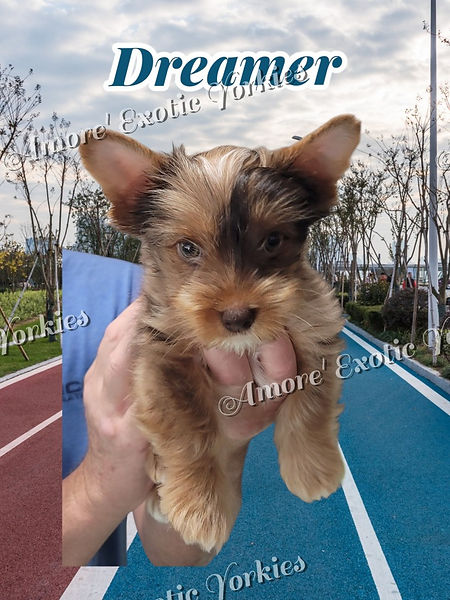

Amore' Exotic Yorkies
Naturally Reared, Beautiful Exotic Colored Yorkies
PLEASE READ ENTIRELY: Due to my numerous serious medical issues, I am retiring from breeding.
I've recently had hip replacement surgery so please be sure you've submitted my puppy questionnaire before contacting me so I can get back to you as soon as possible. Thank you for understanding my process. I am located in Delaware but my husband can drive to meet up to 90 minutes from our home for free if you are driving 6 or more hours away.
Sapphire has 1 male not spoken for yet. This is my last litter. I am also placing 2 females that are 2 years old. Scroll down to see pics and info.
If you are having issues submitting the puppy questionnaire, email me at amoreexoticyorkies@gmail.com and I will send it in the body of an email so all you will need to do is fill it out and send back to me.
Thank you. Pics below...
PRICING IS BASED ON SEX, CONFORMATION, ESTIMATED ADULT WEIGHT, COLOR, PET OR FULL REGISTRATION, ETC.
"Dreamer"
Male-Estimating 6 lbs
He has green eyes
$1900 Pet Price
Breeding price is more to approved Breeder only


Heiress is 8-8.5lbs and recently had a dental that cost me $1000. Her pet price is $800 firm. With all my medical conditions, I am not allowed to pick up more than 5lbs. If being placed as a pet, she will need to be spayed. No papers are given when placed as a pet.
She can go with breeding rights to an approved breeder only.
Heiress is health tested clear and is an extreme white gold dust parti merle with 1 blue diamond eye. She should be coming into heat any day now.
She just turned 2 years old on July 2nd, 2025.
Breeding rights is $2400


Sapphire is 2.5 years old and is being placed as a pet only. NO BREEDERS! She weighs 6lbs and will be ready around the end of August 2025. I will not hold without a deposit. She weighs about 6lbs and has a blue diamond eye. No papers are given when being placed as a pet.
$1500 Firm



What’s So Risky About Puppy Shots?
Here's the Truth...
For most dog owners, it’s not news that yearly boosters – or any boosters really – are at best unnecessary and at worst harmful.
You know that reducing the number of vaccines is critical to your dog’s health, but when it comes to puppy shots, we’re still over-vaccinating.
And we’re doing it at a critical time in your dog’s life.
Let me explain …
Why Routine Puppy Shots Shouldn’t Be Routine
As we know, puppies are given a series of several vaccinations, spaced two to four weeks apart.
This is pretty standard practice … and we’ve come to believe that a series of puppy shots is necessary for them to be protected. But this simply isn’t true.
It takes zero vaccines for a puppy to be protected. It’s called Natural Immunity!
So why are puppies vaccinated three or four times instead of just once? I believe the bottom line is $$$$!
Maternal Antibodies...
When puppies are very young, they’re protected from disease by drinking their mother’s first milk, called colostrum. This rich milk contains antibodies against disease (called maternal antibodies), which the mother passes down to her puppies.
The puppy’s immune system isn’t fully mature, and able to fully protect him, until your puppy is around six months of age, so the maternal antibodies provide something called passive immunity.
This might seem like a good idea, but here’s the problem with those maternal antibodies …
When a puppy with a reasonable amount of maternal antibodies is vaccinated, the maternal antibodies will essentially inactivate the vaccine, just as it would a real virus.
As good as those maternal antibodies are, they can’t protect the puppy against the other toxins contained in vaccines such as the chemical adjuvants and preservatives which contain harmful chemicals including mercury, MSG, aluminum and formaldehyde.
The adjuvants are designed to stimulate an exaggerated immune response, to make sure that your puppy’s body responds to the small amount of virus contained in the vaccine.
Unfortunately, this heightened reaction can also cause autoimmune disorders which are affecting an alarming number of dogs and can include:
-
allergies
-
cancer
-
thyroid disease
-
digestive diseases
-
joint disease
… as well as a rather long laundry list of other common health issues.
More Is Better?
Vets and pet owners used to believe that ‘more is better’ when it came to vaccines.
But we now know there are very real dangers with every vaccine given … and the more vaccines, the more likely something is to go wrong.
Maternal antibodies weaken over time but the rate of weakening differs between different dogs and even different breeds. Especially when it comes to parvovirus.
The maternal antibodies for parvo can last longer than other common puppyhood diseases – as long as 26 weeks in some dogs – and that presents a problem for our puppy shot schedule which is basically revaccinating every 2-4 weeks starting at 7-8 weeks.
Now, if you’re concerned about the risks of vaccination – and you should be – then this vaccine schedule really doesn’t make much sense. Although nearly every puppy is vaccinated this way. This doesn't protect puppies from infectious disease, it just puts them at unnecessary risk for allergies, cancer and other very common diseases.
Intelligent Vaccination is NO VACCINATION!
Now imagine the puppy who is vaccinated three or four times. By the time he reaches 12 or 16 weeks of age, he’ll be LESS LIKELY to be protected than the puppy who wasn’t vaccinated at all! Why? Because his own immune system will be healthier and stronger and more able to combat disease and infections.
And don’t forget, if he’s received vaccines (the more vaccines, the worse they are destroying his immune system)so not only is he less likely to be protected, he’s at more risk for adverse reactions and the common chronic diseases like allergies, cancer and more.
What You Can Do To Make Sure Your Puppy Is Protected
If you feel you must vaccinate your puppy but want to reduce the risk as much as possible, I suggest using Homeopathic Nosodes.
Have your vet run a titer test three weeks after using the Homeopathic Nosodes. If there is circulating antibody (any amount will do), it means your puppy is protected and he will be protected for life! (Don’t believe vaccines can protect for life?)
And ironically, one of the most dangerous places you can take your puppy is the vet’s office!
If you must bring your puppy under 12 weeks to the vet, it’s important to carry him in and out of the clinic, as this is one of the most likely places for him to pick up viruses. Your best bet is to get the first appointment of the day, when you know the floors and tables will be at their cleanest.
We don’t like to think about it, but vaccination has the very real risk of creating chronic, debilitating disease.
Most vets and dog owners don’t see the connection because it can take weeks, months or even years after vaccination for these diseases to develop.
Needlessly stressing your puppy’s immune system with vaccinations every two to four weeks is no longer a safe option for puppies.
Find a vet who agrees with me and who is aware of this research and you’ll reduce the risk of both infectious and chronic debilitating disease in your puppy – now and in the future.